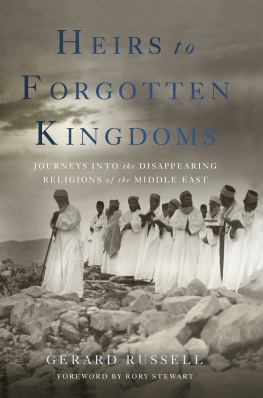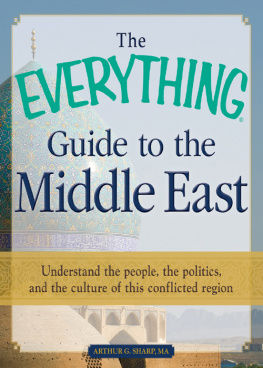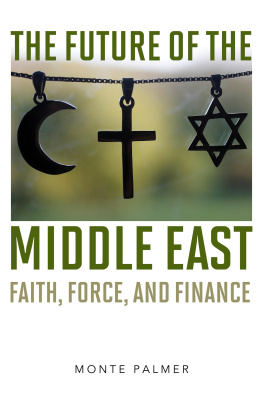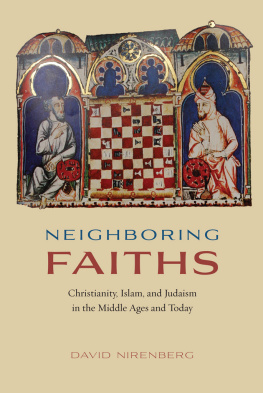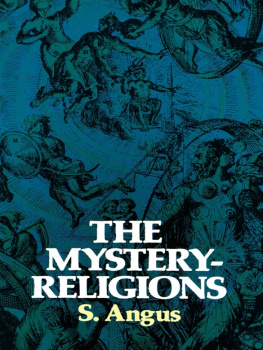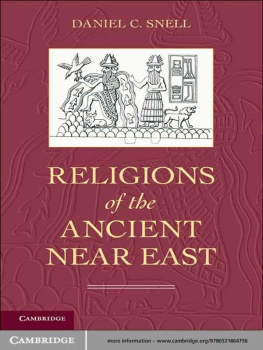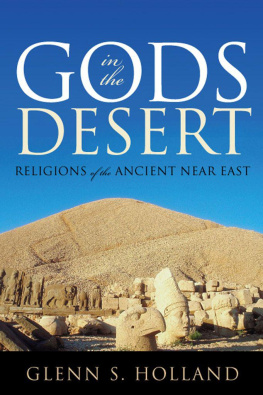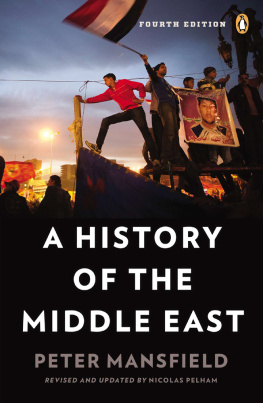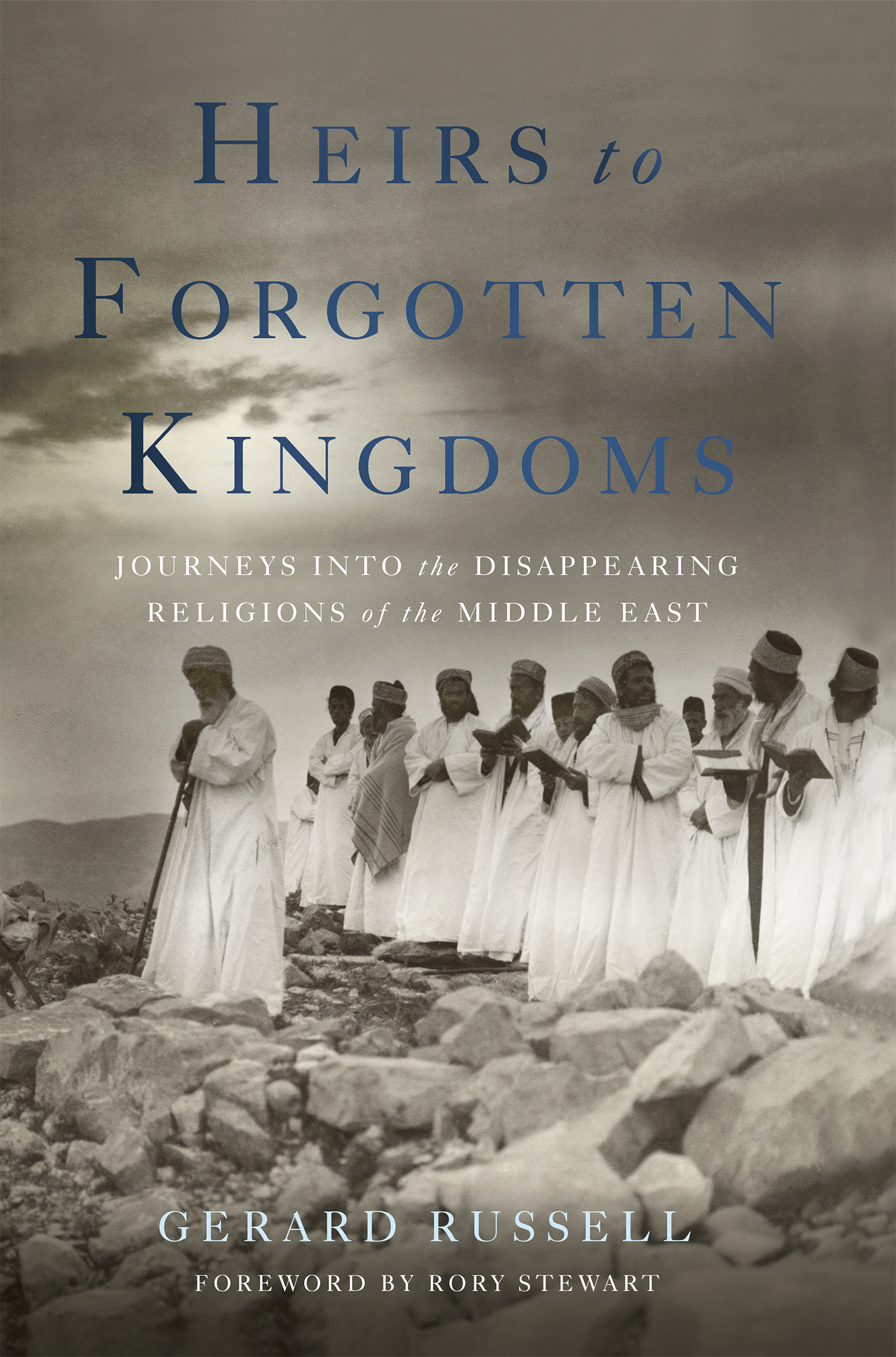More Advance Praise for
Heirs to Forgotten Kingdoms
As the al-Qaeda splinter group, ISIS, storms across Syria and Iraq and attempts to destroy the Yazidi religious sect, now comes Gerard Russell, an erudite, polylingual former British diplomat, who documents the fates of the ancient religions of the Middle East, many of which are on the brink of extinction. Russell writes beautifully and reports deeply, and his account of these disappearing religions will be an enduring anthropology of largely-hidden worlds that may disappear within our own lifetimes.
Peter Bergen, author of Manhunt: The Ten-Year Search for Bin Laden from 9/11 to Abbottabad
Oxford and Harvard, fluency in Arabic and Farsi, postings with the British Foreign Service in the Middle East and Afghanistanas a scholar-diplomat Gerard Russell seems almost too good to be true. He brings these gifts to his beautifully written account of some of the most fascinating and little known communities facing the challenges of globalization. Read it to understand the complexity ofand hope inour world.
Ambassador Akbar Ahmed , Ibn Khaldun Chair of Islamic Studies at American University in Washington, DC, and the former Pakistani High Commissioner to the United Kingdom
An eloquent and sensitive portrayal of the Middle Easts lesser known religions, whose existence is severely threatened by the strident nationalisms and proxy wars that are currently tearing apart a region once renowned for its tolerance. Gerard Russell gives a voice to those who cannot speak for themselves, those whose traditionshanded down through many centuriesare being disregarded and indeed obliterated in a blaze of violence and hatred. He lifts the veil of ignorance and reveals just what is at stakeboth in the Middle East and around the world. Through extensive and meticulous research, and encompassing years of travel to distant places to meet in person those whose lives have been turned upside down, Mr. Russells passionate message touches the heart and reminds us of the value and beauty of tolerance.
Ali Asani, Professor of Indo-Muslim and Islamic Religion and Cultures, Director, Prince Alwaleed bin Talal Islamic Studies Program, Harvard University
At a time when minoritiesand even majoritiesare being persecuted across the Middle East, ancient faiths continue, just barely, to survive. Gerard Russell not only recalls a more tolerant past through his sketches of now exotic tribes and rituals, but also paints a deep and complex relief to help us understand this troubled regions evolution. Russell is a true classical diplomat: explorer, linguist, scholarand master storyteller.
Parag Khanna , author of The Second World: Empires and Influence in the New Global Order
Gerard Russells beautifully written book provides wonderful insights into the Middle East and the beauty of the different cultures that have flourished there for centuries. It is a welcome respite from the usual portrayal of violence in the region, and at the same time a wakeup call of what will be lost if a perverse form of violent extremism is allowed to prevail. At a time when religion is so often seen as a cause of war, this book shows how lives can be enriched by maintaining rituals and beliefs through generations.
Emma Sky , Senior Fellow at the Jackson Institute for Global Affairs, Yale University
Heirs to Forgotten Kingdoms
Heirs to Forgotten Kingdoms
Journeys into the Disappearing
Religions of the Middle East
Gerard Russell
A Member of the Perseus Books Group
New York
Copyright 2014 by Gerard Russell
Published by Basic Books,
AMember of the Perseus Books Group
All rights reserved. Printed in the United States of America. No part of this book may be reproduced in any manner whatsoever without written permission except in the case of brief quotations embodied in critical articles and reviews. For information, address Basic Books, 250 West 57th Street, New York, NY 10107.
Books published by Basic Books are available at special discounts for bulk purchases in the United States by corporations, institutions, and other organizations. For more information, please contact the Special Markets Department at the Perseus Books Group, 2300 Chestnut Street, Suite 200, Philadelphia, PA 19103, or call (800) 810-4145, ext. 5000, or e-mail .
Designed by Pauline Brown Typeset in Times New Roman
A CIP catalog record for this book is available from the Library of Congress.
LCCN: 2014948120
ISBN: 978-0-465-03056-9 (hardcover)
ISBN 978-0-465-05685-9 (e-book)
10 9 8 7 6 5 4 3 2 1
To my parents
And to Linda Norgrove, Vadim Nazarov,
and others who shared my journeys
but are no longer here to read this book
Contents
By the early eighth century, Muslim rulers controlled most of the land between Afghanistan and the edge of North Africa. But Islamic stateswhich developed in Europe a reputation as fierce and exclusiveproved ultimately more tolerant of other religions than Western Christianity. In Europe, pagans were eliminated so completely and so rapidly that the details of the pre-Christian religion of somewhere like Britain can barely be recovered. In the Muslim world, however, complete pagan religions were allowed to survive intact into the twenty-first century, and it is still possible to interview their believers.
There are the Yazidis of northern Iraq, whose temples include a statue of a peacock, somehow associated with the devil. There are the Kalasha of the Afghan-Pakistan border, whose faith incorporates wooden statues of ancestor-heroes. From Lebanon to Iran religions survivesome with a special relationship to fire, others that center on immersion in water, others with focus on the sun and the moon. Some of these faiths long predate the birth of Christ.
The subject is wonderful. These groups are not just symbols of religious sensibilities and possibilities now faded. They suggest a great deal about the origins and evolution of the major world religions. And they are challenging components of a modern world: intricate compressed identities, rooted in history and landscape, but also systems of belief that have changed dramatically over time, incorporated rival religions, and been exported to new lands.
But the subject is almost impossible. These religions are formidably difficult to access, understand, or describe. They survived partly because they are located in some of the most remote, mountainous, and dangerous regions of the Middle East. The believers sometimes speak obscure, archaic languages. The archives and scholarly accounts of the faiths are intimidating. In some cases the religions are esoteric: it is forbidden to record, discuss, or reveal their beliefs. In other cases, the religions are persecuted, and believers have had to learn to conceal the details of their faith, to avoid being murdered. They rarely can or will speak to outsiders. It is, therefore, very difficult to imagine someone qualified to address the subject.
Gerard Russell is one of the few people able to write a book of this kind. Born in 1973 in America to British parents, Gerard Russell studied classical languages and philosophy at Balliol College, Oxford. He then joined the British Foreign Service, which sent him to Cairo to learn Arabic. His Arabic became sufficiently fluent for him to become the UK public spokesman on Arabic news channels. He was posted to Iraq after the US invasion, became consul general in Jeddah, and then was political counselor in the embassy in Kabul. In those posts, when many diplomats remained isolated from the local populations, he developed strong friendships with Arabs and Afghans outside the compound, aided by his linguistic skills, and became an ever greater expert on the countries and people with whom he lived. In 2009, he joined a group of Afghan specialists at the Carr Center for Human Rights Policy, at Harvards Kennedy School.

